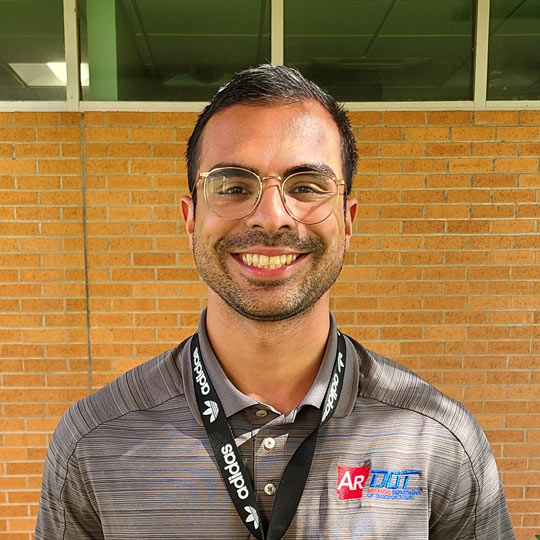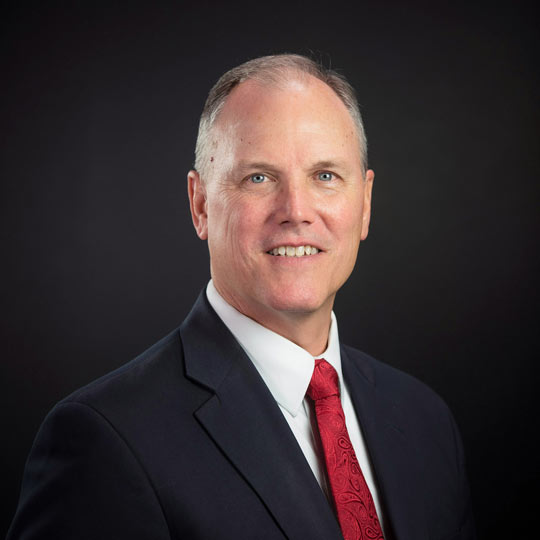Arkansas charges forward with EV
Accelerated approach earns first-round NEVI plan approval
The Arkansas Department of Transportation is charging forward with its vision to create a statewide network of high-powered electric vehicle charging stations. We received first-round federal approval of our 2022 Electric Vehicle Infrastructure Deployment plan in September 2022 after beginning the planning process in May and submitting the document by the Aug. 1 deadline. Approval unlocked more than $19 million of the $54 million in National Electric Vehicle Infrastructure Formula Program funding designated for Arkansas, giving us a jump-start on developing a competitive procurement program. We anticipate issuing a request for proposals this summer.
Dual-purpose plan
Our EVID plan directly responds to the U.S. Department of Transportation’s Federal Highway Administration NEVI Formula Program to strategically deploy a nationwide, interconnected network of fast-charging stations on all Interstate Highways and FHWA-Designated Alternative Fuel Corridors.
Beyond meeting the requirements of the NEVI program, our EVID plan will support Arkansas’ burgeoning electric vehicle economy. BloombergNEF estimates more than half of U.S. car sales will be electric by 2030. Increasing consumer demand combined with government and business interest in electric vehicles is creating a recipe for jobs and success in Arkansas. Our state is fortunate to be home to world-class businesses embracing electric vehicles. Walmart, a leader in placing EV charging stations at its locations across the country, recently partnered with Canoo, an automotive startup that manufactures electric vehicles and is setting up headquarters here in our state. Under the agreement, Walmart will purchase 4,500 electric delivery vehicles from Canoo. ArcBest, a transport company in Fort Smith, Arkansas, has purchased electric trucks and tractors. We also have a GM auto manufacturing plant and battery manufacturers in our state. By implementing our EVID plan to build a statewide network of EV charging stations, we will support Arkansas’ business-friendly ecosystem and spur economic development.
In Part 1 of our EVID plan, we will complete full buildout, per federal rules, on our Interstate Highways and Designated AFCs. We estimate a minimum of 15 charging sites will be needed, at an average cost of $1 million each, fully installed. That would leave millions of dollars of NEVI Formula Funding for Parts 2 and 3 of our EVID plan, which will bring electric vehicle charging stations to regionally significant routes that serve a large number of travelers and other routes to be identified through stakeholder engagement. Depending on final bids and site locations, Arkansas could build between 45 and 65 NEVI-compliant EV charging sites throughout the state.
Accelerated approach
An interlocking set of federal rules and laws, Arkansas state laws and ARDOT agency rules govern the federal NEVI funds that ARDOT will award to eligible proposers to install charging stations outside DOT right of way. Getting our arms around EV charging technology and the NEVI program in only four months was challenging, but we were able to accelerate our learning curve with the following strategies:
A team of experts. We assembled a project management team of experts, including the Arkansas Department of Energy and Environment, our key public agency partner. The ADEE leads Arkansas’ Volkswagen Clean Air Act Civil Settlement program, in which the state received $14.6 million for air pollution mitigation and prevention projects. One of its mitigation programs is financial assistance for the installation of direct current fast chargers along major interstates, the very EV chargers we intend to deploy in our plan. Partnering was a natural and smart first step.
ARDOT also brought expertise to the planning table. Our Transportation Planning & Policy Division was responsible for developing the EVID plan, and it fits well with our division. We are responsible for providing long-range multimodal transportation planning for the state, which is what the EVID plan is for EV charging stations. The federal grant process experience provided by our program management division helped facilitate planning and approval.
The sum of our efforts was a powerhouse project management team whose collective knowledge was greater than any one member.
We also collaborated closely with the Arkansas Electrification Working Group, a group ARDOT assembled whose members include the ADEE, the FHWA-Arkansas Division, the Public Service Commission, Arkansas utilities, metropolitan planning organizations, Arkansas Governor’s office, Arkansas Clean Cities, Arkansas Municipal League and the County Judges’ Association of Arkansas.
Clear, straightforward communication. We created an efficient plan that clearly articulated how we planned to spend the formula funds. Our EVID plan relied heavily on graphics and maps to visually communicate complex technicalities, such as charging station specifications and the federal rules that govern federal highway funding. Our efforts were rewarded with first-round approval and praise from The Joint Office of Energy and Transportation, which said ours was one of the clearest, most succinct, articulate plans they had reviewed.
To further enhance understanding of the EVID plan, we created an interactive geospatial mapping tool highlighting and numbering the 11 charging station gaps we have identified along Arkansas interstates. Anyone can access it, see the locations of current NEVI-compliant charging stations, look at the network gaps and prioritize their development. The response so far has been excellent.
Engage utilities early. Once the Joint Office approved our EVID plan, we began focusing on the procurement process and what that might look like. Private-sector businesses applying for NEVI funding to install, own, operate and maintain charging stations will need to conduct site assessments, which will require coordination with their electric utility providers. Engaging and informing the utilities of those impending requests will be crucial to maintaining our accelerated approach.
On Dec. 7, 2022, ARDOT hosted an informational webinar for utility providers in the state. Topics included procurement, timelines and a description of costs that will be eligible for reimbursement through federal NEVI funds. We also shared with participants an early draft of the assessment form proposers will fill out as part of the funding process.
We walked away from the webinar with valuable feedback on the assessment form’s wording and a baseline understanding of power availability along our interstates.
A blueprint for a prosperous economic future
The NEVI Program envisions a future when everyone who wants to can ride and drive electric vehicles. We see that future, too, but we also envision a future where our EVID plan supports Arkansas’ strong economic development and growth in the EV space.
ABOUT THE AUTHORS
 Aarón Pinedo, PE
Aarón Pinedo, PE
Advanced Transportation Planning Engineer
Arkansas Department of Transportation
Aarón Pinedo is an Advanced Transportation Planning Engineer at the Arkansas Department of Transportation. He began his professional career at the department in January 2019 as an engineer in the Transportation Planning & Policy Division. He is part of the project management team for the NEVI Formula Program and is ARDOT’s point of contact for the program. Aarón holds a bachelor’s degree in civil engineering from the University of Arkansas.
Contact him at aaron.pindeo@ARDOT.gov or (501) 569-2064.

Brad McCaleb, PE
Division Engineer, Transportation Planning and Policy
Arkansas Department of Transportation
Brad McCaleb is the Division Engineer of the Transportation Planning & Policy Division at the Arkansas Department of Transportation. He began his career with the department in November 2015 as a Staff Planning Engineer in the same division. He also served as the Assistant Division Engineer and the Division Engineer of the System Information and Research Division from 2016 to 2021. Brad has bachelor’s and master’s degrees in civil engineering and a master’s degree in business administration from Texas A&M University.
Contact him at brad.mccaleb@ARDOT.gov or (501) 569-2201.
SEE MORE ARTICLES
